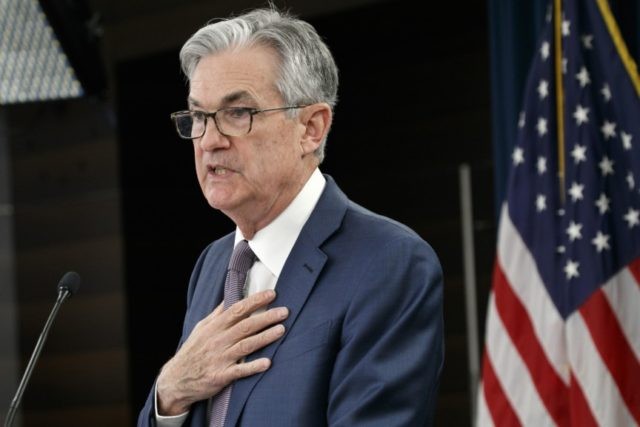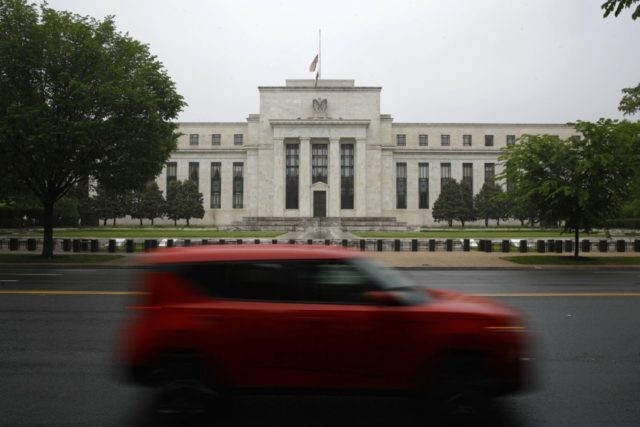Powell Says Economic Outlook Is ‘Extraordinary Uncertain’

WASHINGTON (AP) — Federal Reserve Chairman Jerome Powell says the outlook for the U.S. economy is “extraordinarily uncertain” and the success of the recovery effort will depend in large part on the country’s ability to contain the spread of the coronavirus.
“A full recovery is unlikely until people are confident that it is safe to re-engage in a broad range of activities,” Powell says in testimony he is scheduled to deliver Tuesday in an appearance with Treasury Secretary Steven Mnuchin before the House Financial Services Committee.
In the testimony released Monday by the Fed, Powell repeats a pledge that the central bank will keep interest rates at their current ultra-low levels until it is sure the economy has weathered the pandemic crisis.
His comments come as parts of the country are experiencing a surge in coronavirus cases that have prompted governors to backtrack some of their steps to reopen their states’ economies.
Powell said the re-opening occurred sooner than expected, with hiring and consumer spending both picking up in May.
“While this bounceback in economic activity is welcome, it also presents new challenges, notably, the need to keep the virus in check,” Powell said.
Both Powell and Mnuchin were expected to face questions from lawmakers on topics including how much more support Congress will need to provide to bolster the economy.
That question has gained new urgency as the surge in cases in states including California, Texas and Florida have raised concerns about possible setbacks to efforts to rebound from the downturn that was brought on by measures to control the spread of the virus.
“The path forward for the economy is extraordinarily uncertain and will depend in large part on our success in containing the virus,” Powell says in the prepared remarks, stressing that a successful outcome will depend on policy actions taken by all levels of government.
The Trump administration has indicated it would be willing to back further economic support on top of the nearly $3 trillion in support already approved. But Democrats and Republicans are split on the size of any new rescue package and what elements it should contain.
The Fed has slashed its key interest to near zero and pumped $2 trillion into purchases of Treasury securities and mortgage-backed securities plus providing additional support through 11 special programs to facilitate the functioning of credit markets for businesses and consumers and borrowing by state and local governments.
“We expect to maintain interest rates at this level until we are confident that the economy has weathered recent events and is on track to achieve our maximum employment and price-stability goals,” Powell said.
Fed Goes Shopping for Jack Daniel’s, Quaker Oats, and Apple

Jack Daniel’s. Quaker Oats. Apple. Walmart.
No. It’s not a list of the latest products that shops are running short of during the coronavirus pandemic. It’s just the names of some of the companies whose bonds the Federal Reserve will start buying.
The Fed on Sunday released a list of roughly 750 companies, including Apple, Walmart and ExxonMobil, whose corporate bonds it will purchase in the coming months in an effort to keep borrowing costs low and smooth the flow of credit.
The central bank also said it has, so far, purchased nearly $429 million in corporate bonds from 86 of those companies, including AT&T, Walgreen’s, Microsoft, Pfizer and Marathon Petroleum.
The Fed announced in March that it would, for the first time in its history, purchase corporate bonds as the intensifying viral outbreak caused panicked investors to dump most types of securities in a rush to hold cash. That pushed up a range of interest rates and made it nearly impossible for companies to borrow more by issuing new bonds.
Yet once the Fed said it intended to purchase up to $750 billion of corporate debt, investors began buying bonds again and eventually large companies resumed issuing large amounts of new bonds. Recent economic research has found that simply by announcing the program, the Fed was able to boost confidence in corporate bonds and improve the market’s efficiency.
Fed Chair Jerome Powell has said that by ensuring large companies can borrow more, the Fed is seeking to keep those firms from having to layoff workers. But the corporations aren’t required to keep all their workers.
At a hearing last week, Sen. Pat Toomey, R-Pa., questioned Powell about whether the purchases were still necessary, since the corporate bond market has largely recovered. Powell said the Fed had to follow through on its promises.
To avoid criticism that it might favor a specific industry, the Fed said two weeks ago that it would seek to mimic a broad market index approach and purchase bonds from a wide range of companies. Consumer product companies, such as Quaker Oats and the distiller Brown-Forman, which makes Jack Daniel’s and Woodford Reserve whiskeys, make up roughly a third of the index. That sector is followed by utilities at 10 percent and energy firms at more than 9 percent. The index also includes insurance companies but no banks.
The Fed will only buy highly rated debt from financially healthy companies, or ones that were highly rated before the pandemic struck. The Fed is legally barred from lending to insolvent companies. It has said it would report on its purchases every 30 days.
The Fed said Sunday that it made its first bond buys from 86 companies last week. Those companies include Nike, broadcaster Fox Corp., Paypal, Target, Campbell Soup and chipmaker Broadcom.
The central bank is also purchasing pools of bonds in exchange-traded funds, which operate similarly to mutual funds. The Fed currently owns $6.8 billion of bond ETFs.
The Treasury Department has provided $75 billion in taxpayer money to backstop any losses from the bond buys. So far, the Fed’s purchases remain modest relative to the program’s announced $750 billion cap.
By comparison, since March it has purchased more than $2 trillion in Treasurys and mortgage-backed securities in an effort to pump cash into short-term lending markets.
–The Associated Press contributed to this report.
No comments:
Post a Comment